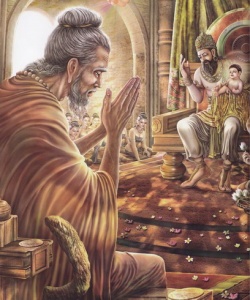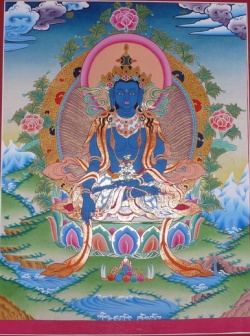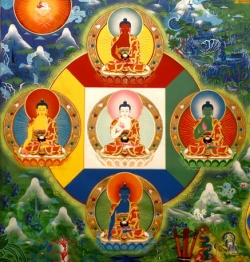Marx and Buddhism by Monica
Introduction
Religious suffering is, at one and the same time, the expression of real suffering and a protest against real suffering. Religion is the sigh of the oppressed creature, the heart of a heartless world, and the soul of soulless conditions. It is the opium of the people. (Marx via Marxists’ Internet Archive)
The final line is the most famous condemnation of religion of the nineteenth century philosopher Karl Marx (1818-1883). (Wolff) It was published in his essay “A Contribution to the Critique of Hegel’s Philosophy of Right” and has been used to justify the harsh suppression of religion by community regimes ever since. This is, in part, because Marx ties the existence of ‘ancient’ and outdated religious institutions to the equally “ancien régime” of the political and economic powers (specifically, in Germany at that time).
In fact, his critique of religion itself is very short and evolves quickly into a concern with power and economics. Unlike most contemporary Americans who unthinkingly accept the so-called separation of church and state, Marx saw religion and (economic) power as part of an inseparable social system created to preserve the status quo – a status quo detrimental to humanity and which must be thrown off. Despite his seeming exaltation of humankind (in place of God), he is quick to make enemies through angry rhetoric calling for criticism to act as the “executioner” to that “criminal” by making “War on the German state of affairs!”(Marx via Marxists’ Internet Archive)
Sadly, under communist leadership this war extended itself into a war on organized religion, obscuring Marx’s perceptive, if naïve, critique of religion itself. Thus most modern people know only that Marxism is hostile to religion, without knowing specifically how and why, therefore denying ourselves of these critical insights. For Buddhists, this means overlooking the “ironic affinities” between Marxism and Buddhism, as well as failing to address the specific points of contention. For example, Marxism and Buddhism both deny the existence of a creator God and immortal soul, see the world as dynamically interrelated, and are fundamentally concerned with human suffering. However, they see the sources of this suffering, and therefore its cure, very differently and Buddhism does posit the existence of an ultimate Truth (buddhanature) which Marx denies, along with a few other metaphysical differences. (Brien, p. 35) In this exploration let us start with Marx’s critique of religion, followed by some general responses, and end with a discussion of the relationship between Marx and Buddhism.
Marx’s Critique of Religion
Rightly or wrongly, Marx saw religion as one of the many social structures contributing to humankind’s (then) present and much deplored state of affairs. He was born into a post-Enlightenment world well in the grip of the Industrial Revolution, in which the rise of science and a Newtonian understanding of physics had let to many technical advances. (Reynolds, p. 63) In some places, notably England and France, these technological advances had corresponded to revolutionary changes in government and social structure. Meanwhile, Germany lagged behind. Marx was roundly dissatisfied by this, even while criticizing the other revolutions as incomplete.
The young Marx fully bought into the Enlightenment notion of ‘progress,’ if not all the theoretical reasons behind it, and began publishing articles and essays during the early 1840’s, including “A Contribution to the Critique of Hegel’s Philosophy of Right” (henceforth “Critique”) and “On the Jewish Question” in 1844. (Wolff) It is in the first of these essays that I am most interested. In this essay Marx states unequivocally that “the criticism of religion is the prerequisite of all criticism.” (Marx via Marxists’ Internet Archive)
- The foundation of irreligious criticism is: Man makes religion, religion does not make man. … Man is the world of man – state, society. … Religion is the general theory of this world, its encyclopaedic compendium, its logic in popular form, its spiritual point d’honneur, its consolation and justification. It is the fantastic realization of the human essence since the human essence has not acquired any true reality. (Marx via Marxists’ Internet Archive)
Here he lays out his allegiance to both Hegel and Feuerbach, but also critiques them. He accepted that God was made in humankind’s image and Feuerbach’s notion that “worshipping God diverted human beings from enjoying their own human powers,” while also asserting that Feuerbach missed the key force driving humans to do this: “alienation in material life” resulting from economic modes of production. (Wolff)
According to Jonathan Wolff (writing for the Stanford Encyclopedia of Philosophy), Marx was seeking to combine and transform the philosophies of materialism and idealism, specifically as part of the first of his “Theses on Feuerbach.”
- Materialism is complimented [by Marx] for understanding the physical reality of the world, but is criticized for ignoring the active role of the human subject in creating the world we perceive. Idealism, at least as developed by Hegel, understands the active nature of the human subject, but confines it to thought or contemplation; the world is created through the categories we impose upon it. Marx combines the insights of both traditions to propose a view in which human beings do indeed create – or at least transform – the world they find themselves in, but this transformation happens not in thought but through actual material activity…(Wolff)
This activity is called praxis or “the dynamic interaction through which the human being shapes the environment in some way, and in so doing shapes itself.” (Reynolds, p. 41) In many ways, it is akin to social karma, which shall come up again later.
As a materialist, Marx denied the existence of God, the soul, metaphysics in general, and any kind of ultimate truth or reality in particular. Yet as an idealist and believer in progress, he felt that humanity’s destiny was still a hopeful one, that it was leading to something. With God out of the picture, it was left to humankind to create that destiny, but humanity could only do that when the existing conservative forces, including religion, were swept away.
Marx believed the proletariat revolution was the key – “a sphere, finally, which cannot emancipate itself without emancipating itself from all other spheres of society and thereby emancipating all other spheres of society.” (Marx via Marxists’ Internet Archive) This revolution would be political and economic, after which the conservative force of religion would die a natural death in the face of humanity’s renewed understanding of their own power. In other words, we wouldn’t need God (or religion), that opiate, anymore.
General Responses
Both the most damning and, perhaps, least critical assessment of Marx is that he failed. Or rather, those following in his footsteps and calling themselves Marxists failed to pull off what they believed to be his ideal communist state. As Huston Smith points out “All of Marx’s major predictions,” which he then lists, “turned out to be wrong…” He then declares that “Modernity’s coming to see the gods it worshiped [i.e. rationalism, science, progress] for what they were – idols that failed – was the most important religious event of the twentieth century,” (Smith, p. 152-153) as though the continued vitality of religion in the face of critics like Marx is alone proof of religion’s efficacy. I would counter that this critique is one-sided. While rationalism, science (and scientism), and progress have failed to deliver on their utopian promises, so has religion (in this life). Also, like religion, they stubbornly persist in modern thought even if we no longer shout their virtues from mountaintops.
Smith praises “Marx’s compassion for the downtrodden” and call to social action but roundly criticizes “his faith in social engineering,” once again citing the failures of the communist regimes of the past century. Marx was wrong to “circumvent the human heart” and believe that an external change can, or should, precede and internal revolution. “Attempts to revolutionize the world to make it conform to a preconceived ideology can lead only to totalitarianism, for history is too unmanageable to conform to our conceptual designs.” (Smith, p. 165-167) Yet I must ask, what is the Kingdom of Heaven (as in the Book of Revelation) if not a “preconceived idea?” Are we off the hook if it is God’s “conceptual design” rather than our own?
John Haught characterizes religion according to Marx as a distraction “from the real task of correcting the unjust conditions” ourselves. (Haught, p. 218) Though Haught does not criticize Marx as directly as Smith does, it is clear he sees Marx’s reliance on human reason and human effort, without recourse to an ultimate truth of some kind, to be inadequate. How can Marx attack religion on moral grounds, that it is “not moral enough,” while at the same time denying any ultimate ground on which to base morality? “If there is no eternally established standards of right and wrong, then what is to keep us from a moral relativism where each person is left alone to decide what is good and evil?” (Haught, p. 242-243) If this is the case, how can we say that economic inequality, that human suffering itself, is a “bad” thing?
Wolff proposes that Marx himself may have been bothered by this very paradox. He wonders if “Marx, like so many of us, did not have perfect knowledge of his own mind.” Wolff points out that Marx never directly stated that capitalism was unjust or that communism would be just, in the moral sense of the word. In the Communist Manifesto, Marx also states “communism abolishes … all religion and all morality, rather than constituting them on a new basis.” Some have argued Marx believed a communist society would “transcend” justice. In the end, all he can conclude is that Marx believed “Capitalism impedes human flourishing” and “Communism clearly advances human flourishing.” (Wolff) Can either be labeled moral on those grounds?
Marx and Buddhism
At this point, in typical Buddhist fashion, I seem to have raised more questions than I have answered. Marx points out in his “Critique” that “The main stem of German morals and honesty, of the classes as well as of individuals, is rather that modest egoism which asserts its limitedness and allows it to be asserted against itself.” (Marx via Marxists’ Internet Archive) In the words of the Zen Buddhist truism: only don’t know. Even on the point of human failure, Buddhism and Marx find ground for agreement.
In his article “Buddhism and Marxism: Ironic Affinities,” Kevin Brien calls out many more areas of accord, as well as several points of divergence. Buddhism and Marxism are both “deeply concerned about human suffering,” “agree that there is no creator God, or eternal soul,” recognizes interdependence, and understand some form of karma, both individual and social for Buddhists, and at least social for Marxists. (Brien, p. 35)
However, Buddhists diverge from Marx in their understanding of the causes of human suffering. As Smith also pointed out, Marx proclaims external forces to be the cause of human suffering, while Buddhists and other religions cite mainly internal forces. A Buddhist would claim that human suffering can be alleviated even in the face of monumental social and economic injustice and material inequality (though no Buddhist would claim this is easy or likely), while Marx would state such is flat-out impossible. This difference results in a fundamental disagreement in means to the same end, alleviating human suffering.
In many cases, it is Marx’s means that have been criticized more than his ends. This has led Brien, among others, to introduce the concept of Humanistic-Marxism. Humanism is not a new ingredient in Marxism, they argue, but rather a more complete understanding of Marx’s philosophy as “an integrated whole” rather than what they call orthodox-Marxism’s “gross distortion of Marx’s thought” caused by an artificial and “radical split between the early and late Marx.” Brien points to Marx’s complaint to Engles about how his theories were being used even before his death: “All I know is that I am not a Marxist.” (Brien, p. 39-40)
I believe Brien’s point about the “ironic affinities” between Buddhism and Marxism is well made, as are his pains to distinguish orthodox from humanistic-Marxism. I see much that is humanistic in Marx’s “Critique,” which, admittedly, is the only essay of his I have read in full. “To be radical is the grasp the root of the matter. But, for man, the root is man himself.” (Marx via Marxists’ Internet Archive)
Smith and Haught’s criticisms seem to be based on their understanding of orthodox-Marxism rather than on the complete philosophy of Marx himself. In this, they seem to be coming from the same place I started this essay at: Marx was clearly wrong, therefore we need not give him much consideration. Moreover, he criticized religion and, seeing as we like religion, we naturally don’t like him. However, most economists and philosophers will agree that Marx also got a great deal right. Therefore, might he also have some valuable insights about religion as well? Might we also be able to grant his the same benefit we grant Darwin and distinguish Marx from the Marxists?
Wolff attempts to walk a middle path by pointing out Marx’s ambiguous relationship with ideas of “justice.” He cites Hume, who “argued that if there was enormous material abundance – if everyone could have whatever they wanted without invading another’s share – we would never have devised rules of justice. And, of course, Marx often suggested that communism would be a society of such abundance.” But while he suggested this would be so, “Marx also refused to speculate in detail about the nature of communism, arguing that it would arise through historical processes, and was not,” as Smith alleges (p. 166) “the realization of a pre-determined moral ideal.” (Wolff) In this way, communism would leave old notions of justice and morality behind.
However, Hume put forth a second way humanity could transcend justice: “…if there were complete fellow-feeling between all human beings.” (Wolff) This, I believe, is also an essential part of the Buddhist path. Through the cultivation of compassion and wisdom, we dissolve the delusion of separation between oneself and others. We mend Marx’s alienation from the inside by realizing the ultimate truth he denies: buddhanature.
Although I see the similarities between Marx and Buddhism, I do not believe the differences are reconcilable. Marx would no doubt criticize Buddhism for its understanding of rebirth as being ridiculously metaphysical and for its separation of mind and brain. However, as Reynolds points out, Marx’s understanding of materialism was based on the physics of his day, not modern quantum physics, which has been consistently unable to find “an ultimate substantial reality” that can be reliably labeled “matter” (or “energy”). Likewise, scientific studies of consciousness demonstrate less and less reliability in the theory of mind as an epiphenomenon of the brain. (Reynolds, p. 63-64) Yet, these two problems Marx would likely have with Buddhism pale in comparison to the first irreconcilable difference.
Perhaps Marx, as other Westerners have done in recent years, would also criticism Buddhism for being too concerned with the internal – sitting on our hands meditating while the world is on fire. However, Buddhism can easily criticize Marx for mistaking the finger for the moon. Moreover, as the Dalai Lama has pointed out, “Because of a lack of genuine compassion their energy becomes much more destructive than constructive.” (Brien, quoting an interview with HHDL conducted by Andrew N. Woznicki, p. 38) This is self-evident in Marx’s “Critique,” which utilizes a startling amount of violent rhetoric, definitely failing the Buddhist test for skillful means (upaya). If it had been evident to Marx that violent words would lead to violent deeds perhaps many of the atrocities of Marxists could have been avoided. This is one reason I called Marx naïve at the outset. That he underestimated the effectiveness and persistence of religion, as Smith notes, is the other reason.
I must conclude by saying that while I believe Buddhists and Marxists can get along (that one could even be both), we will never make for easy bedfellows.
Bibliography
Brien, Kevin M. “Buddhism and Marxism: Ironic Affinities,” Dialogue and Universalism, No. 1-2/2004, p. 35-59
Haught, John F. What is Religion? An Introduction. New Jersey: Paulist Press, 1990.
Marx, Karl, “A Contribution to the Critique of Hegel’s Philosophy of Right,” Deutsch-Franzosische Jahrbucher, 7 & 10 (February 1844), Paris. Accessed at the Marxists’ Internet Archive on April 28, 2011, URL = < http://www.marxists.org/archive/marx/works/1843/critique-hpr/intro.htm>
Reynolds, John Myrdhin, “Some Thoughts on a Buddhist-Marxist Dialogue,” Dialogue and Universalism, No. 1-2/2004, p. 61-65
Smith, Huston. Why Religion Matters: The Fate of the Human Spirit in an Age of Disbelief. New York: Harper Collins, 2001.
Wolff, Jonathan, “Karl Marx”, The Stanford Encyclopedia of Philosophy (Spring 2011 Edition), Edward N. Zalta (ed.), URL = <http://plato.stanford.edu/archives/spr2011/entries/marx/>.





